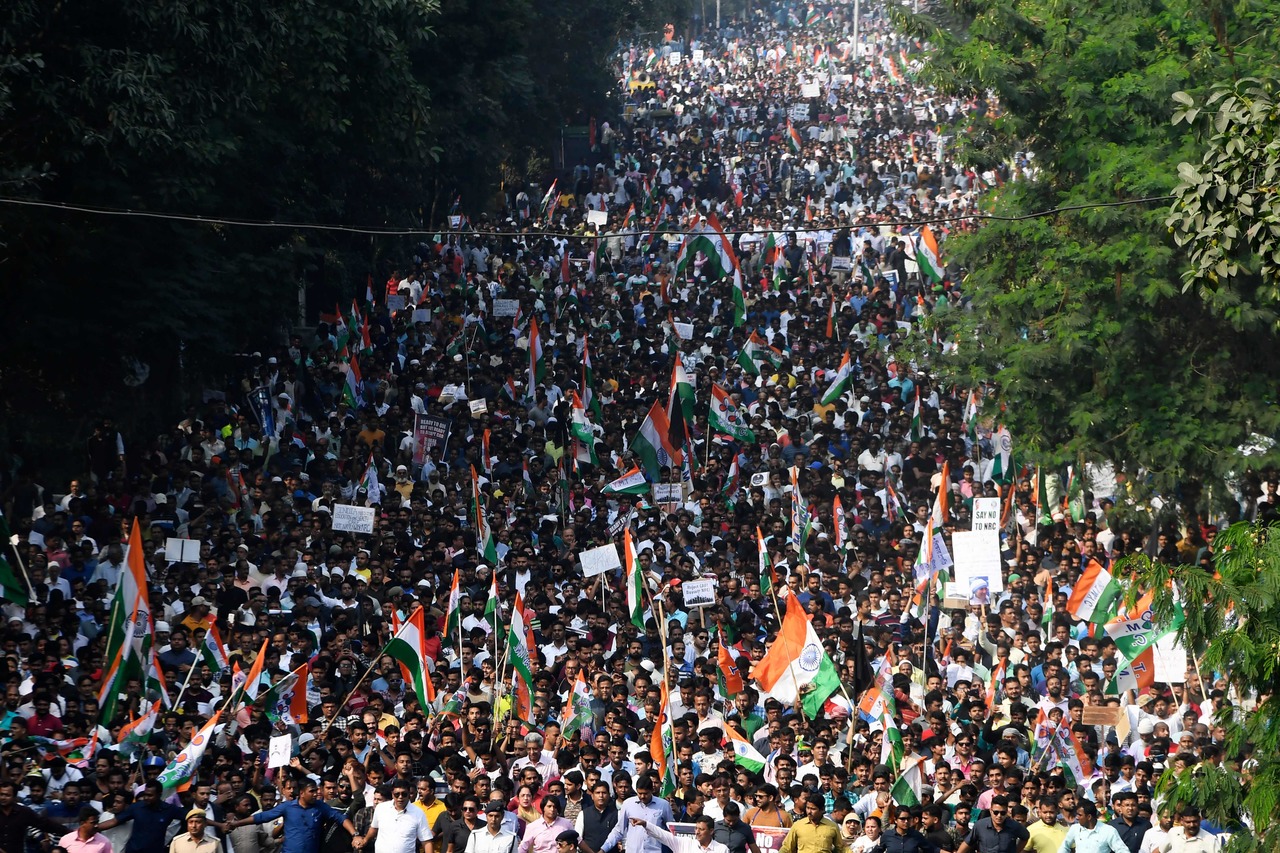Modi presses his vision for a Hindu nation, and India erupts
Sign up now: Get insights on Asia's fast-moving developments

Supporters and activists of Trinamool Congress participate in a mass rally to protest against the Indian government's Citizenship Amendment Act in Kolkata on Dec 16, 2019.
PHOTO: AFP
NEW DELHI (NYTIMES) - Prime Minister Narendra Modi's government has rounded up thousands of Muslims in Kashmir, revoked the area's autonomy and enforced a citizenship test in north-eastern India that left nearly 2 million people potentially stateless, many of them Muslim.
But it was Modi's gamble to pass a sweeping new citizenship law that favour every South Asian faith other than Islam that has set off days of widespread protests.
The law, which easily passed both houses of Parliament last week, is the most overt sign, opponents say, that Modi intends to turn India into a Hindu-centric state that would leave the country's 200 million Muslims at a calculated disadvantage.
Indian Muslims, who have watched anxiously as Modi's government has pursued a Hindu nationalist programme, have finally erupted in anger. During the past few days, protests have broken out in cities across the country.
Mumbai. Chennai. Varanasi. Guwahati. Hyderabad. Bhopal. Patna. Pondicherry. The disturbances keep spreading, and on Monday they tied up several areas of the capital, New Delhi.
Modi's government has responded by calling out troops, shutting down the internet and imposing curfews, just as it did when it clamped down on Kashmir. In New Delhi, police officers beat unarmed students with wooden poles, dragging them away and sending scores to the hospital. In Assam, they shot and killed several young men.
India's Muslims had stayed relatively quiet during the other recent setbacks, keenly aware of the electoral logic that has pushed them to the margins. India is about 80 per cent Hindu and 14 per cent Muslim, and Modi and his party won a crushing election victory in May and handily control Parliament.
But Indian Muslims are feeling increasingly desperate, and so are progressives, many Indians of other faiths, and those who see a secular government as fundamental to India's identity and its future.
The world is now weighing in, too. United Nations officials, US representatives, international advocacy groups and religious organisations have issued scathing statements saying the citizenship law is blatantly discriminatory. Some are even calling for sanctions.
Critics are deeply worried that Modi is trying to wrench India away from its secular, democratic roots and turn this nation of 1.3 billion people into a religious state, a homeland for Hindus.
"They want a theocratic state," said B.N. Srikrishna, a former judge on India's Supreme Court. "This is pushing the country to the brink, to the brink of chaos." "This is how waves of communal violence start in the country," he added.
On Monday, Modi called for calm, saying on Twitter that the law "does not affect any citizen of India of any religion" and "the need of the hour is for all of us to work together."
This citizenship law was a much touted campaign promise and a special wish of his Hindu base. His supporters see a future India as a place that emphasises its Hindu heritage as much as possible and eliminates the special legal protections that exist for Muslims and other minorities.
The new citizenship legislation, called the Citizenship Amendment Act, expedites Indian citizenship for migrants from some of India's neighbouring countries if they are Hindu, Christian, Buddhist, Sikh, Parsee or Jain. Only one major religion in South Asia was left off: Islam.
Indian officials have denied any anti-Muslim bias and said the measure was intended purely to help persecuted minorities migrating from India's predominantly Muslim neighbours - Pakistan, Afghanistan and Bangladesh.
The legislation follows hand in hand with a divisive citizenship test conducted this summer in one state in northern India and possibly soon to be expanded nationwide. All residents of Assam, along the Bangladesh border, had to produce documentary proof that they or their ancestors had lived in India since 1971. Around 2 million people in Assam's population of 33 million - a mix of Hindus and Muslims - failed to pass the test and now risk being rendered stateless. Huge new prisons are being built to house anyone determined to be an immigrant in the country illegally.
A widespread belief is that the Indian government will use both these measures - the citizenship tests and the new citizenship law - to strip away rights from Muslims whose families have been living in India for generations.
The way that will happen, many Muslim Indians fear, is that they will be asked to produce old birth certificates or property deeds to prove citizenship and will be unable to do so. And while Hindu residents in the same situation will be given a pass, it seems, Muslim residents will not have the same legal protections.


